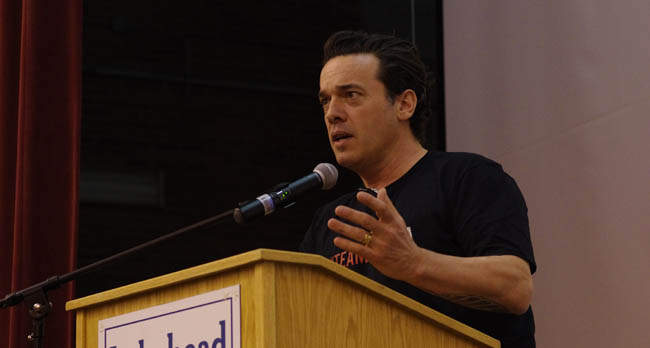‘The Orenda’ tells some tough history

By Rick Garrick
THUNDER BAY – Pic River’s Russell Twance hopes Joseph Boyden’s bestselling The Orenda” will lead to improved relations between First Nations and other people across Canada.
“I would hope the impact he is going to (have) is going to either improve relations or shed some light on history,”Twance said following the award-winning author’s March 5 talk at Lakehead University. “It’s something that needs to be changed, something that has to be taught to other people at large.”
“The Orenda”, set in the 1600s during the early days of contact between First Nations people and European newcomers, was declared the winner of CBC’s Canada Reads 2014 literary competition for a novel that could inspire social change. The story follows the paths of a Huron Elder-warrior, a Jesuit missionary and an Iroquois girl through a changing world.
“The germs of this novel began when I was just a child living and spending much time on Christian Island and in the Georgian Bay islands,” Boyden says. “In the 1600s something traumatic happened to a people and things changed.”
Boyden, of Anishinabe, Irish and Scottish heritage, learned about the Jesuit perspective while attending Jesuit schools in suburban Toronto. His family vacationed in Georgian Bay each summer.
“I knew the Jesuit side of things, this idea that the Jesuits came to this dark land in order to bring light to the ‘sauvage’, to the savages,”Boyden says. “I knew that side of things, but does that mean my mom’s side of the family, that we are savages?”
Boyden says “The Orenda” is his life’s work.
“It’s a part of my DNA,”Boyden says. “I feel like I have a foot pretty firmly in each world, the Aboriginal world and the non-Aboriginal world.”
Michipicoten’s John-Paul Chalykoss, a Lakehead University Masters of Education student, appreciates how Boyden’s three novels, Three Day Road, Through Black Spruce and The Orenda, have brought First Nations history to the forefront across Canada.
“With The Orenda, he’s going through some pretty tough subjects,”Chalykoss says. “There’s scenes of torturing and sometimes we have to look back through and realize that we have our own tough history to deal with as well.”
But Chalykoss also stressed that First Nations people have worked together with others and continue to do so.
“They don’t see eye-to-eye, but they have to work together somehow,”Chalykoss says. “And it’s almost the way it still is today.”
Biinjitiwaabik Zaaging Anishinaabek’s Roseanna Hudson enjoyed meeting Boyden, who signed her copy of The Orenda.
“That was awesome, exciting,”says the Thunder Bay Indian Friendship Centre’s restorative justice coordinator. “He would be a good role model for a lot of our youth, a lot of up-and-coming students and other Aboriginal people who are interested in writing books.”


